Toshiba Satellite U845: Ultrabooks Go Mainstream
by Vivek Gowri on October 8, 2012 5:00 PM EST- Posted in
- Laptops
- Intel
- Toshiba
- Ivy Bridge
- Ultrabook
Toshiba’s Satellite U845 is a bit of a mixed bag. They ended up with a pretty solid notebook from a design point of view, which is an encouraging step in the right direction for Toshiba. I’m very hopeful that the level of design and build quality found in their tablets and Ultrabooks will trickle down to the rest of Toshiba’s lineup, and having a well designed Satellite is the first sign of that happening.
But I do have some significant concerns here, though a lot of them aren’t isolated to the U845. The display panel quality is utterly mediocre, the bloatware is blatant nonsense in this day and age, and for a supposedly budget system, $749 is not that inexpensive (especially for the configuration that amount buys you). It’s not a bad system, but it doesn’t do enough to justify the price. I’d rather have something along the lines of Sony’s VAIO T13, a system that’s thinner, lighter, and better designed, with better battery life and a not quite as bad display.
I want to see this type of notebook, or something along the lines of this spec (say, the Samsung Series 5 NP530-U3C/U4C, the HP ENVY 4-1030us), end up around $600, instead of $800. And as fate would have it, that's exactly what we're seeing with the current price rebates. If those hold up, $600 for the U845-S406 is at least reasonable, and it goes a long way towards excusing the kind of display and other cost-related compromises found in the U845. It makes this a budget laptop that's actually priced like a budget system.
Initially, the U845 left me a bit disappointed. I wish that more companies would pay attention to the overall end user experience, the same way that manufacturers approach serious smartphone and tablet products, and the way ASUS is doing with their Zenbook systems. I'm not saying that every system needs to be super thin or supremely powerful; obviously, at certain price points it just isn't possible to create a mind-blowing system. But even at low to midrange price points, it's worth paying attention to the minor details that can affect the overall experience. Toshiba clearly knows this, as shown by their Excite line of tablets, which makes it all the more plexing why they can't do it with their portable PC products. It’s about time something legitimately shook up the notebook industry.
In the meantime, street pricing of the U845 is about $280 less than the MSRP, and that makes the product viable. If you're in the market for an Ultrabook but don't want to spend a lot, this is the sort of compromise you end up with. It won't win any awards, but after uninstalling all the bloatware you end up with a reasonable thin and light laptop.












57 Comments
View All Comments
ccd - Monday, October 8, 2012 - link
If I want to consume media, I'm getting a tablet. If I want a machine to do office work, I need at least 15" screen which would also include a decent sized keyboard. Anything below 15", ultrabook or not, will soon become some form of tablet.teiglin - Monday, October 8, 2012 - link
Strongly disagree. For casual browsing on the couch, I much prefer a laptop to a tablet. From the options of an iPad, a Galaxy Tab 7.7, and an 11" Samsung Series 9, the Series 9 sees by far the most couch use.For "media consumption" (which is a pretty ambiguous term, but which I take to mean "watching TV shows/movies), a tablet may or may not be better--of course, on the couch, I generally use the TV, and when travelling, an ARM tablet tends to have the advantage thanks to battery life.
Personally, I tend to agree that the 13-14" form factors that seem to be the most common laptop screen sizes nowadays are not ideal; for me, 11" is more comfortable to use while lounging, and certainly stepping up in size gives you a more usable keyboard, but for any work involving actual typing, I find it hard to use any laptop keyboard at all--although I've never had a job that involved a lot of travel and typing concurrently, so I guess if you don't have the luxury of a real keyboard, it's just a matter of how much size you're willing to sacrifice to ease the weight of your carry-on.
Belard - Tuesday, October 9, 2012 - link
Dunno about you but, I'm on my iPad now.... Went from couch to toilet to bed... As Steve Jobs envisioned. My desktop is a few feet with a nice 24" display... But I'll type small messages like this on the tablet.You cannot hold a notebook like a book. You cannot share info on a notebook like you can on a tablet... As nAturally.
Different people like different things, each their own. I do use a tablet a bit more than my notebook, but desktop wins.
SodaAnt - Monday, October 8, 2012 - link
I disagree for a few reasons here. I think there's still plenty of space for a 11-13" ultrabook for on the go work. I can't do decent typing on a tablet, and unless I'm hauling around a lot, I'd rather not carry a 15" laptop. However, a light 11" ultrabook is perfectly fine for typing and writing up documents, and is also good for media consumption too.rwei - Tuesday, October 9, 2012 - link
Agree with this, and I've been flip-flopping. My 'portable' toolkit currently consists of an iPad 3 and a Thinkpad x120e.iPad is nice because the screen is purrty, and it barely weighs more than 1lb (don't need charger for anything up to a 2-day trip). Notable downsides include feeling like a tool.
However, the Thinkpad is nice because of the keyboard, being a real computer (full Office suite, MusicMonkey, browser), and (ironically, seeing as the iPad is the media device) of being more convenient for watching movies and music, since I don't have to convert everything (e.g. FLAC) and/or manage to a 32GB capacity. Then again, icky screen and >3x the weight w/ charger (5-6hr life isn't enough).
I'm always torn between which to bring. Bringing both would obviously be dumb.
Hopefully this resolves itself once Windows 8 hybrids launch and mature, to get me all the best functionality aspects of the Thinkpad in a more iPad-like package.
kaalus - Monday, October 8, 2012 - link
Must be a joke. Please stop even reviewing this crap. When someone soiled their pants there's no point looking in there.Conficio - Monday, October 8, 2012 - link
So many people don't need thin and don't need light. Especially not when you buy on a budget anyway. What users need and want is good screen, sturdy chasis with a keyboard with little/no flex, good trackpad.Even a good venting system that does not need cleaning every 6 mo or a hinge that survives more than 12 mo of light use, is more important than slim and light.
And in a 15" laptop add two 2.5" drive bays!
Conficio - Monday, October 8, 2012 - link
Actually meant to add, I'm not surprised they are not selling that well.Bob Todd - Monday, October 8, 2012 - link
The same thing passes through my mind on almost every Ultrabook review. Up at the ~$1000 range, these things are competing with higher end Windows laptops with quad core regular voltage CPUs, 8GB of RAM, dedicated GPUs, good build quality, and possibly an IPS panel or really strong TN (up to 1080p). And sadly the "regular" laptops that draw a lot more power aren't suffering in battery life since these Ultrabooks usually have freaking tiny batteries. Most of these haven't been good enough to be my only laptop, so I'll trade a little thinness and weight for a better overall package (e.g. Lenovo X230 all the way up to an Envy 15).10/100 Ethernet is a joke and these companies should be ashamed. Gigabit can't add much to the BOM in late 2012. It's far less frustrating when doing certain tasks (e.g. creating/restoring from images on the network, etc.), and not including it even at $600 is nuts. I could forgive some of this stuff if all of these Ultrabooks got 8+ hours of battery life. But as it stands, most of these aren't remotely compelling to me. I know why I see so many MacBook Airs in airports and so few Ultrabooks. The Air is a solid overall package, at least for the 13" (battery life, panel, SSD, etc.). There have been more impressive Windows "thin and lights" in the last few years than Ultrabooks. Hopefully they move the needle in the right direction for the average Ultrabook with the new models coming out and cheaper IPS/SSD component costs.
seapeople - Tuesday, October 16, 2012 - link
I agree on the battery thing - if a machine's entire purpose is to be extremely portable, then shouldn't one of it's best features be battery life?I've voiced this complaint before, and all I seem to get are replies of "But 6 hours is all you need! Assuming you close your laptop between meetings that should get you through all day at work, right?"